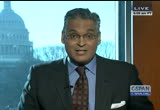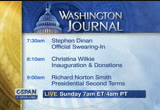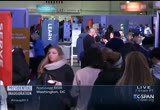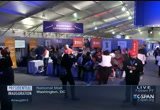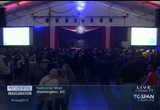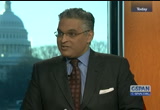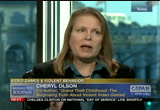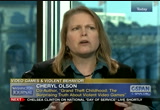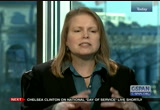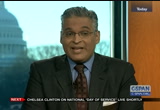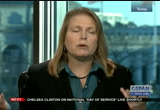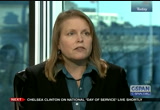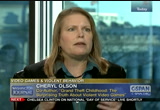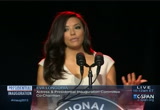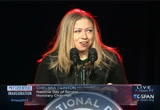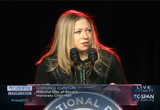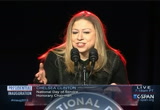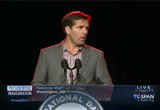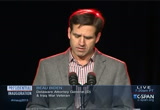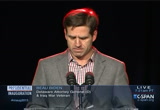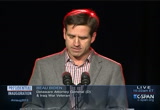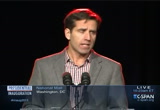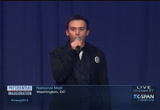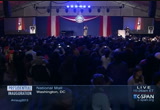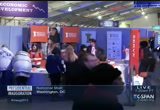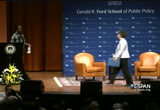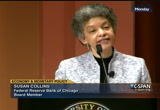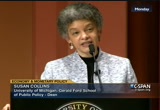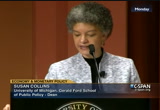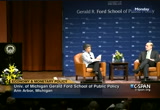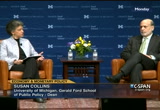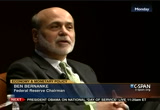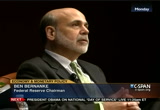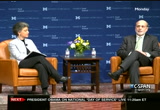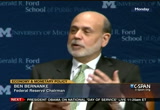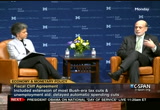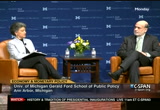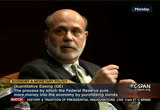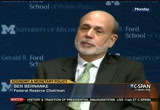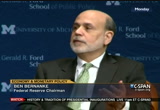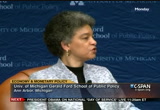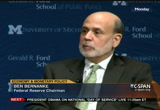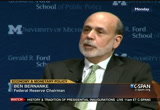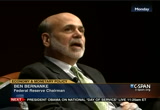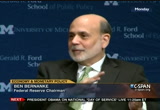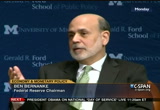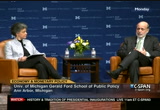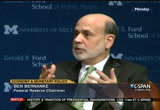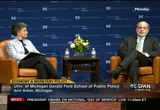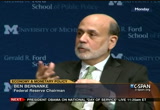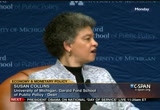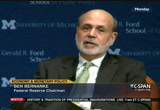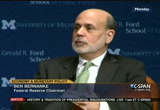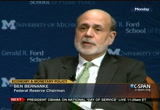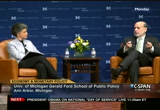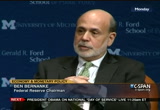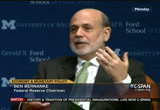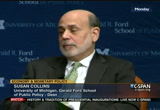tv Inauguration CSPAN January 19, 2013 10:00am-11:05am EST
10:00 am
the 57 presidential inaugural starts tomorrow just before noon. a part of our coverage includes "washington journal"and that you concede tomorrow when we have our guest from "the washington times" will talk about the official swearing in. we will hear from "the huffington post." the topic will be corp. donations when it comes to inaugural activities. we will learn about the funding mechanism there. also from 9-10, and historian from george mason will talk about presidents and their second term. that is tomorrow at 10:30, our coverage starts of the official swearing on monday, our coverage starts at 7:00 a.m. with the public
10:01 am
swearing-in. you can listen non c-span radio or you can do to c-span.org for more information. starting today, activities all around the washington, d.c. metro area. and also a day of service honoring martin luther king, jr.. an event starts at 10:00, just about now, just outside the capitol building. you can see that event live on c-span. we will see you tomorrow. [captioning performed by national captioning institute] [captions copyright national cable satellite corp. 2013] >> this weekend's c-span we can near duration starts at the
10:02 am
state service event. booths and volunteers passing of information about organizations looking for volunteer help. we wait to hear from former first daughter chelsea clinton. c-span's cameras will be captured in the sights and sounds around the nation's capital today. this actinic of the first lady michelle obama, along with her daughters will be attending -- this afternoon, the first lady michelle obama, lawless daughters will be attending any event.
10:03 am
10:04 am
he is under rock war veteran. he is the son of vice president joe biden -- he is an iraq war veteran. he is the son of vice president joe biden. ♪ >> before chelsea clinton arrives here in the national mall to kick off the day of service, we will take him look at it, race -- a conversation about violent video games. we will watch as much of it as we can until the speakers began. >> part of the president's proposal this week was looking at video games. >> i think it is a good idea depending on how it is done. there is a fair amount of research, but very little of it
10:05 am
is designed to inform the public. we really need more research. >> specifically where? >> first of all, it is not the concern that the violent video games will trigger kids to hurt people, but looking at juvenile offenders in seeing if they're violent video use is somehow different. i would like to see kids with mental health problems. it is so unlikely that anyone kid will be influenced by a video game that way. in the real world, we do not see any links between violent crime and videogames. know how tos don't handle stuff. some kids may handle stuff by
10:06 am
itself medicating -- by self medicating with video games. >> when you look at the research, what is the commonly- held belief between video-game usage and people acting out? what was your research? >> there must be linked. the vice-president, at the meeting he held on video games, said of front, from the research i have seen, i don't see a link between violent video games and violent crimes. but the public thinks so and that is why you're here. who is doing what where, with whom, why, for how long -- i studied seventh and eighth grade kids. i did a lot of surveys of those kids.
10:07 am
playing a violent video game is normal behavior for a 13-year- olds today. but among the girls, the second most popular game series is grand theft auto. when you analyze that, you see bullying and getting in fights and looking at the link between playing violent video games and bullying and getting in fights. we found that stressful life events and aggressive personality was the link between violent game played. >> what drives the perception? >> if you see one of those clip
10:08 am
collections of the most violent games, you think, it is awful. i think what worries parents that it is, but it is a book or movie, i can get the dvd or read the book. but for a gamer, they worry that the active shooting in a game vs. watching it in the movie must be worse for you. >> taking a look at research on violent video games here to answer questions, not only about her research, but proposals from the president. you can ask her questions. if you want to post on facebook
10:09 am
or send us in the mill, -- send us an e-mail, to get your thoughts on it. is there a standard definition when it comes to video games on what is a violent? >> there isn't. that is a great question. i was worried about the california law that the supreme court has ruled down, schwarzenegger, of all people, having been involved in violent movies committee wanted to ban the sale of what they call ultra violent video games in california. no one ever said what that was. if you were shooting aliens, would that account? who would decide what this was? my concern was that there would be publishing in the paper something like, this kid is restricted because, if you go
10:10 am
into this thing here, it is violent. and it does not address in the real issue. use of research has not been done at the policy level. >> i think the nih and the cbc would make sense. -- the cdc would make sense. industry reach search, stand- alone, people would say that that's tainted. i think there is good stuff out there that can help parents and policymakers. >> you were at the meeting. how did they react?
10:11 am
>> industry people were glad that there were not automatically being targeted. even if there were a link, as the vice-president said come it would be such a tiny amount compared to the other factors he looked at that week. some people were saying, if i am a parent, i think the games i make as a developer are good games. if there were things i could do to reduce harm, i would want to do that. what we do is art. it is an entertainment art form. this is not about behavior change. >> our first call is from farmington, maine, republican line. >> it is great to be with you
10:12 am
guys. the media has a huge impact. i watched the thing on c-span having to do with moving east -- with movies. >> we will leave this conversation. you can find it online. taking to the day of service tent on the national mall here in washington, d.c. for remarks from co-chair eva longoria. >> a lot of you know, i grew up in corpus christi, texas. and i grew up in a family of volunteers and a family and community of people who wanted to give back. my three sisters and i were very blessed to have a great role models, which were my parents, who dedicated their lives to serving the others. i mother was a special-education teacher. [cheers] my dad worked on the army base.
10:13 am
my parents were crystal clear about what they wanted for us and that was an education. so a lot of what we did to give back was in the educational arena. i love that president obama house the same values. he knows that, for our nation, and education cannot be a luxury. it will strengthen the middle- class and strengthen the work force will keep some of davis -- that will keep us innovated. if you're thinking about how you can search or how you can follow the president's example to honor this national day of service, start with this. make a difference in one child's life. mentor a student. donated book to a library, doenitz applies to a neighborhood school. -- donate a book to a library,
10:14 am
donate supplies to a school. i am here because i have someone looking out for me. i'm telling you how important my education was. someone was pushing me to succeed. but i want to make sure the next generation has that as well. so last year, when i launched the eva longoria foundation, i focused on helping advance what team as -- advance latinas in education. a belief that america should be a place where hard work pays off, where ambition can create opportunity, and, no matter where at you look like or where you come from or what your last name is, you can make it if you try. [cheers and applause] let's start this new year by achieving america's promise. we will go back to our schools
10:15 am
and students and we will serve our community. and you will be serving your country when you serve your community. and is to make the dream of a good education a reality, it will enrich your life as well. it is my honor not to introduce someone who is -- who has giving back in her dna, the national chair of this national day of service -- chelsea clinton. [cheers and applause] ♪ >> good morning everybody. thank you, eva. to want to echo what eva said and say how wonderful it is to see everybody in this room.
10:16 am
this day in particular has a lot of personal meaning for me. i am proud of my parents for countless reasons. [cheers and applause] i am glad you feel the same way. but one of the reasons i am particularly proud of my father today is that, 19 years ago, he signed that made martin luther king day a national day of service. [cheers and applause] and when he signed the bill, he reminded us of what dr. king often called life's most persistent and urgent question -- what are you doing for others? and in my family, the only wrong answer to that question is nothing. but there are as many right answers as there are people in this tent today and people in our country. eva spoke about how her parents inspired her. my parents certainly inspire me
10:17 am
every day. but today, when i engaged in a service project with my husband mark, i will be thinking about my grandmother dorothy who started giving back when she was a child. she volunteered in her local school, helping to tutor migrant workers, farm children in southern california, in reading in english and writing. as she got older and had her own children, she provided school trips. she always wanted to cook an extra lunch for someone whose parents could not provide that for them. when she got older still, her children, including my mom, had left the hall. she became a big sister to mentor young girls like her who had been neglected and abused as a child. when she got older still and she could not do that any longer, she would knit clothing to donate to her local church. and then when she got older
10:18 am
still and she could no longer in it, she gave with money she could to support the big sisters and big brother program and to help still ensure that little girls like her would have people who had believed in them, just what she had summit people who believe in her because she always believed that every child who had been neglected to grow up and be a mother, to have a home full of love and support so their children, like my mother, could have dreams that reached the sky. and that is the chain of service in our country and i am deeply grateful to the inspiring example of my grandmother and my parents and i am so grateful to see some much enthusiasm in this room today. and i hope that today will be either the only most recent date of service in so many of your lives, particularly with so many of the children in the tent today, your first day of service. it is so much more fun when we
10:19 am
all work together. it is my great honor and privilege to ask beau biden to the stage. >> good morning, everyone. thank you for leading the support and effort here in this inaugural weekend. thank you for your leadership here and think the most importantly to you all out here on this chilly saturday morning. your dedication is inspiration to me and my family. this event, the national day of service, is a wonderful way to honor, as chesley just eloquently and noted, the legacy of dr. king. but it is also a reminder that our veterans of our nation, every day is a big service for them and every day's a day of
10:20 am
sacrifice. today, in my career in the military, i have had the honor of serving with two heroes whose service and sacrifice i have seen up close and personal. as of yesterday, we remember today the 6572 brave men and women in uniform who paid the ultimate sacrifice. [applause] returning home as fallen angels in my state and delaware. as you look around this magnetism all, you will see memorials to that service, memorial honoring those who made the ultimate sacrifice for their country. but there are fewer monuments to the thousands of selfless acts
10:21 am
of service and sacrifice performed every day around this country and the world by our servicemen and women. whether a is a 17-year-old boy reporting for basic training after begging his mom to sign a waiver to allow him to join or to national guardsmen who leaves his hall and his family as the storm approaches to go fill sandbags to protect another person's home, whether it be in a hurricane or super storm sandy. you can clap for that. that is right. [applause] the servicemen and women and the veterans and their families were here with us this morning are living monuments to that service. their commitment to serve, their willingness to volunteer should be inspiration and is an inspiration to me and it should be to you and i know it is.
10:22 am
in spite of all the talk of how divided we are as a nation, how we are as a country, more and more americans are coming together to serve each other every day. volunteers in america is at a five-year high. in 2011, americans spent 8 billion hours giving back to their communities, enough hours to build the entire state building more than a thousand times over. [cheers and applause] you represent that. you're organizing food drives, mentoring children from the building playgrounds and so much more. when i look out and see you all and the kids here today, your service is having an even greater impact because you're in selling what my wife and i and brother and sister-in-law and my sister and brother-in-law are trying to do with our kids, instilling that had a service,
10:23 am
making it second nature to but others first as chelsea's parents taught her. so my request to you today is to take advantage of the hundred + organizations in this tent and on the small around this city that are out there to see if there is one where their mission matches your passion and consider serving our veterans as a small way of repaying the service that they have given to us. as my father said, help us show with the strength of our -- helpless show that the strength of our example as an example of our strength. plug in to do all they can to strengthen our nation.
10:24 am
[cheers and applause] today, we can all and hand and do the same. and in doing so, we are working to make our great country worthy of our veterans service and their sacrifice. thank you and god bless our troops. [choose and applause. >> let's hear it for bowl by been -- for beau biden and chelsea clinton and eva longoria. i would like to present a video message from our first lady, michelle obama. [video clip] >> thank you also much for
10:25 am
participating in today's national day of service. with your hard work today, your showing once again that, by giving back, we can live up our fellow citizens and build a healthier and stronger communities. thank you again for volunteering and let's all pledged to serving your country, not just today, but every day, however we can. that is how we will continue to honor the memory of dr. martin luther king and show our shared values of service and citizenship. thank you so much and god bless. >> we have an incredible day for you here today. after the program, please check out all the wonderful organizations in the back. that is where you can pledge hours to help your community and our country all the along. i would like to bring up an incredible performer with a voice like an angel. she is the activist and activist
10:26 am
and gospel singer, let's hear it for ms. adams. -- for miss yolanda adams. [applause] >> i am so glad you're here and i am honored to be here for the national day of service. showing out all day today. not just today, let's do it every day, ok? service is service is service is service every single day. we must be reminded that someone somewhere need this. even if you can give a hand or listen to someone's problems, that is better than i doing anything at all, right? let's sing.ll, ♪ yeah ♪ yeah ♪
10:28 am
we talked periodically what should be every day ♪ ♪ no broken heart ♪ let's never have an end ♪ ♪ here i am ♪ if you ask me ♪ do i love you, i say ♪ yeah uphen you say will i give it everything to follow you ♪ ♪ yeah, yeah think of all to you have done for me ♪ ♪ i say nothing but yeah ♪yeah ♪ if you ask me do i love you ♪ i say yeah give up everything
10:29 am
♪ ♪ i will, yeah, yeah, yeah ♪ ♪ i will say yeah ♪ yeah yeah will follow you ♪ ♪ i say yeah yeah ♪ yes, i love the lord and i will do my part ♪ ♪ yeah yeah ♪ ♪ and i will say that whatever i can do today ♪ is love that is good that good that is good ♪ amen thank you. i like it when the band is here because the track stops and you are, like -- and you guys are great.
10:30 am
one of the songs i had a chance to write with one of my friends of mine is called "never give up." hopefully, throughout the course of this day come it will be a parent you come in a matter where you find yourself in life, you cannot -- throughout the course of this day, it will be apparent to you, no matter where you find yourself in life, he is such a great example and she is such a great example, why are they not throwing in the towel? because we cannot give up. ♪ we heard earlier from the vice president's son, beau biden. we also heard from chelsea clinton and eva longoria.
10:31 am
we will be checking back in at this event on this inauguration weekend. later, we will have remarks from president obama. he is scheduled to speak at 11:45 a.m. eastern. and then michelle obama will be with her kids at the kids inaugural ball. as washington gears up for the inaugural festivities, ben bernanke talked about the u.s. economy and the fed's role in monetary policy. he called on congress to raise the debt ceiling in the release of u.s. can pay its bills. he spoke at the gerald ford school of public policy. >> thank you very much. it is also my great pleasure to
10:32 am
welcome all of you here today. on behalf of the gerald r. ford school of public policy, the university of michigan is extremely honored to welcome the hon. ben bernanke, chairman of the board of governors of the federal reserve system. today's conversation is the latest in our series of distinguished lectures, policy talks at the fort school. we're so pleased that region white can introduce to the events and we're also very president marye sue: here today as well as -- we also have several of the university's executive officers and beans. i would like to welcome all of them and thank them for joining us today. it is an honor and truly personal pleasure to introduce our next guest.
10:33 am
the fed's charges to provide a healthy economy. this is a complex and critically important mission and it makes the person at its helm one of if not the most important the policy makers worldwide. chairman ben bernanke was first appointed fed share in 2001. that was the most challenging time for monetary and financial policies since the great depression. chairman bernanke was uniquely prepared for this extremely .omplicated role a as a highly respected economist, he taught at harvard and mit before being asked to serve on the princeton faculty.
10:34 am
he is an expert on the role of central banks and he is renowned for his research on policy during the great depression, specifically how the fed could have handled things better. in fact, in 2000, he wrote a paper entitled a crash course for central bankers, which was published in foreign policy. he has a deep and longstanding commitment as well to education. he recently took a timeout to do a town hall meeting for k-12 teachers. so i am particularly pleased to say that, joining us in the audience, is an advanced placement economic class from a high school. we're delighted to have you with us. a word about our format. for the first portion of our time, dr. bernanke will join me here on the stage in a conversation about a number of economic issues. for the rest of the time, he has graciously agreed to take questions from the audience. around 4:30, our staff will be
10:35 am
coming through the aisle to get question cards from you. those watching on line and those of you in the audience are welcome to tweet your questions as well. we will select questions, along with two of our graduates students. it is my great pleasure and honor to welcome to the stage chairman ben bernanke. [applause] >> before we get started, want to take a minute to remember ned gramm let who taught here at the university of michigan. [applause] he was one of the first and
10:36 am
dean's if not the first dean of the policy school year. i knew him as a member of the board of governors of the federal reserve in washington. he was a terrific colleague. he was one of the first people to figure of the subprime issue, as you probably know. it was a great loss when he passed a few years ago. so i just wanted to say that and to thank you for inviting me to michigan. >> we're delighted to have you here, and thank you for your special n your specialed gra -- special words about ned gramlet. perhaps a good place for this -- for us to start our conversation, i am sure we have been paying attention to the fiscal cliff. that is a term that you are credited with pop ruralizing --
10:37 am
for popular are rising -- for popularizing. a deal struck recently. what are your views of the outcome. when you think about fiscal policy, there are a whole lot of issues. first is the long run sustainability of our debt. as experts have shown, if there is new changes in the next couple of decades, deficits will rise, the debt to gdp ratios will rise and our debt will become unsustainable. an important objective for policy is to bring the federal budget under control over the next few decades. as you know, we're still in a relatively fragile recovery and we want to avoid taking fiscal
10:38 am
actions that will push the economy back into recession. that was one of the risks that the fiscal cliff pose. tax increases and spending cuts to that size, the cbo and others estimated that unemployment would rise and we very well might go back into a recession. so the challenge is to achieve long run sustainability without unduly hampering the recovery which we have. the deal that was struck, together with the previous work in 2011 that involved some spending cuts made some progress in both of these goals. on longer and sustainability, over the next decade or so, we have seen some movement toward stability in terms of the debt to gdp ratio.
10:39 am
more work can be done, for sure. and then, on the short run, the fiscal cliff deal on new year's eliminated a good bit of the components of the fiscal policy that would have had such bad effects. not completely, but it was a good start. so there was a bit of progress on both of these goals. but i should hasten to say that we are not out of the woods because we are approaching a number of other fiscal critical watersheds coming up. we have the funding of the government, the so-called sequester, number of spending cuts that were laid as part of
10:40 am
the fiscal cliff of arrangement. and we have the infamous debt ceiling that will come into play. we will see a lot of activity in the next few months, debates about the purpose of the government, about the size of the deficit, and a lot of back- and-forth over these three issues. i want to say one word about the debt ceiling. not many people understand what the debt ceiling is about. raising the debt ceiling, which congress has to do periodically, gives the government the ability to pay its existing bills. it doesn't create new deficits. it does not create new spending. so not raising the debt ceiling is sort of like a family, which is trying to improve its credit rating, shane, i know how we can improve our credit rating. we will pay your credit card bills. that is not the best way to improve your credit rating.
10:41 am
all of these issues are important, but it is very important that congress take necessary action to raise the debt ceiling to avoid a situation where our government does not pay its bills. >> and number of people have expressed concern about how much of the chill news were addressed in the deal. it went part way, but it leaves a number of issues still on the table and negotiations are looming. would you characterize that as an additional cliff that is facing us? or is it not as concerned as it was when you raised that term initially? >> as i said, the fiscal kloof, if allowed -- the fiscal clef, if allowed to take place, would probably create a recession this year. a good part of that has been addressed. but nevertheless, we have a set
10:42 am
of a restrictive fiscal policies now. federal fiscal policy will subtract from real gdp growth something on the order of one% to 1.5% this year. it is quite a drag on the economy. there is more work to do. let me be clear about that. it will be a long haul. it will not happen overnight. basically because the government budget represents the values and priorities of the public and decisions being made about what to spend on, what to tax and so on are difficult and contentious decisions and will take some time to address. >> those issues, of course, are not the specific per view of the fed. why not shift gears and talk specifically about what the fed
10:43 am
is doing and what it might do. perhaps a way to introduce that is to say that the fed has been keeping interest rates that close to zero, since roughly 2008. it has the 3 d been unconventional policies recently come in particular, the very massive asset purchases. the third round recently launched, meant to bring long- term rates. can you tell us if it is working? >> to go back one step, as you said, we brought the short-term interest rate back to zero. for many years, monetary policy involves moving the overnight interest rate up and down. then we get a situation in 2008
10:44 am
where we had brought the short- term rate down about as far as it could go, almost entirely to zero. so the question is what more can the fed do? a decade ago, there were a lot of articles about how the fed would be out of ammunition if it got a short-term rate down to 0%. but a lot of work by academics and researchers that central banks suggested that there was more that could be done once you get the short-term rate down to zero. in particular, what you can do is try to redress the longer- term rates, bring them down. there are two basic ways to do that. one day is through talk, communication. sometimes known as open mouth operations. [laughter] the idea that come if you tell the public view will keep rates low in the long term, it will have the effect of pushing down long-term interest rates.
10:45 am
the other way is to buy large quantities of longer-term treasury securities or mortgaged-backed securities that we can drive down interest rates those affect spending investment in the economy. the latest episode, so far, we're getting some effects. it is kind of early. but overall, it is clear that, through the three iterations that you referred to, we have succeeded in bringing long-term rates down pretty significantly. clear evidence of that would be mortgage rates. as you know, a 30-year mortgage rate is something like 3.4%, incredibly low. that in turn makes housing very affordable and that is helping the housing sector recover, creating construction jobs, raising house prices, raising
10:46 am
activity in that sector, real estate activity and so on. broadly speaking, we have found this to be an effective tool. but we will continue to assess how effective because it is possible that, as you move through time and the situation changes, that the impact of these tools could vary. i think what we have decisively shown is the fact that the short-term interest rates coming down to zero, what is known as the 0-lower bound problem, does not mean that the fed is out of ammunition. i would add that other central banks around the world have done similar things and have had some success in creating more monetary policy support for the economy. >> you mentioned that there has been evidence of longer term interest rates have come down. a concern is that the unemployment rate remains very
10:47 am
high and to further increase activity to bring that down, one would hope to see some additional movement from the most recent round. are you suggesting that one would need to be patient? can you say a little bit more about how you would assess whether this most recent round is having the kind of the fact that you expect or anticipate? >> as i said, we will be doing that on a regular basis. we will be looking first at the impact on financial markets. we will see some impact there. we will be looking to see whether or not the labor market situation is improving. there has been some modest improvement. when we first began talking about the latest round, the unemployment rate was about 8.1% and it is now 7.8%. so there has been some movement. a labor market with nearly 70%
10:48 am
unemployment and 40% of the unemployed -- with nearly 7.8% unemployment and 40% of the unemployed being unemployed long term, those are way too many people with their skills and talents being wasted. and they are suffering significant hardship. so we will continue to evaluate. i can't give you specific criteria. we will be looking at the impact on financial market conditions and see how they linked to developments in labor markets and in the broader economy. as always, you have to make assumptions. you have to ask yourself what would have happened if we had not taken these actions, but, again, the evidence seems to be -- i would cite not only evidence on the u.s., but on the u.k. and elsewhere -- these types of policies do have some
10:49 am
impact on the economy. at this point, having reduced the short-term interest rates to close to 0%, we're looking for the tools that we can get to get better outcomes. >> hopefully, there will be more of an impact going forward to continue to bring the unemployment down more quickly. you mentioned that you're looking at the kinds of tools that are available. is there more in the toolkit that would have additional affected? >> on the pace of improvement, that is an interesting question. the pace of growth, of economic growth, over the last few years, since the beginning of the recovery, has not been as strong as you normally would think is needed to get really big improvements in the labor market. nevertheless, we have seen a decline in unemployment from 10%
10:50 am
to 7.8%, which is fairly significant and we hope to see ongoing improvement. so it is a little bit hard to judge how much more improvement we will see. certainly, we want to keep things going in the right direction. there are two principal approaches. either securities purchases or communication. there are a few other things of smaller magnitude, like the interest rate we pay on the excess reserves, for example. i think those are the two basic approaches that we have. of course, we can continue to try to improve our communication, look for ways to be more effective, but there -- as far as i am aware, there is no completely new method that we have not tapped. >> we have just had a meeting of the detroit board of the board
10:51 am
of directors of the chicago fed, as you know, which provides some information about the conditions more explicitly in this region and the conditions across the country are quite varied. i wonder if you could share how you factory in the differences across different parts of the economy when making decisions that are more aggregate. >> first, thank you for joining the detroit branch. people probably don't know, unless you have been studying this, but every federal reserve bank around the country, the 12 reserve banks, and a good number of additional branches, each one has a board of directors drawn from the private sector. it could be academics, it could be business lepeople, community leaders, nonprofit organizers and so on. we draw these people in
10:52 am
primarily to get their input and their insight. there is is a very large and complex economy. there are many different sectors. and it is very helpful to us to have people, leaders from different parts of the economy, from different parts of the country providing this input and giving us somebody to bounce ideas off of to help us make better decisions and understand what is going on. that is very useful. i attended at least part of the meeting this morning with the detroit branch and i heard from a number of people about the auto industry, health care, academics, a variety of things. so that is actually very useful. in terms of the local economy, lycian is still, not withstanding that has become a -- michigan is still, not
10:53 am
withstanding that it has become more diversified, but it distilled very much reliant on auto sales. it had dropped so sharply during the recession. the unemployment rose 15%, something like that, compared to the 10% national peak. it has now come back quite a bit as the auto industry has improved. we are seeing some strengthening, all the conditions here are still not where we would like them to be. the housing market also has come back some in michigan. but like so many other industrial parts of the country, like pittsburgh steel plants and other places, michigan is also diversifying and is bringing in high-tech, various types of services, health care and education and so on. places like the university of michigan ann arbor are a tremendous research for entrepreneurs, people trying to draw up new high-tech businesses.
10:54 am
so this is a good sign to see that america still has a powerful industrial base, but it is diversifying into a wide range of new types of industries. so it is a large and complex economy. i don't know if you want to talk about the broader economy or not, but we can come back to it if you like. we have been seeing some improvement in the labor market. it is still not where we would like to be. growth has been moderate. there are some positive signs to look at. one of the key positives is housing. as you know, house prices fell about 30% and the amount of construction fell extraordinarily over this recession. now for the first time since 2007 or 2006, we see increases in production.
10:55 am
rising house prices will affect household wealth. that is what i hope will be a better year in 2013 and 2014. a few other things that are positive, just to point out, is that state and local governments which had been very contraction remote -- great contraction ary mode, they are in better shape than they were. as a result, they will not be a drag on the academy that they have been in the last few years. -- on the economy that they have been in the last few years. energy. consumers are more optimistic. the university of michigan publishes the index of consumer sentiment, one of the very best guides on how consumers are feeling. as long as the fiscal policy
10:56 am
get too messed up, the consumers seem to be a little bit more upbeat. so there are some positives. but i want to be clear that, while we have made some progress, there is still quite a ways to go before we will be satisfied. >> as you well know, there are some very vocal critics of fed policy. i wonder what you might say to those who argue that. for example, the policy of maintaining interest rates at such low levels, that has taken some of the pressure off congress to address these fiscal tone descent the best of the asset purchases have greeted extremely high risk, perhaps under-appreciated risk for future inflation. >> there are critics on both
10:57 am
sides, you know. you should give the other guys a chance. [laughter] >> i will get their leader. let me first say that, as we think about the cost and risk of a policy, which is also think about what we're trying to accomplish. i made reference already, but the federal reserve has a dual mandate from congress to achieve or at least to try to achieve price stability and maximum employment. price stability and low inflation. we have basically meant that to be 2% inflation. it has been below 2% and appears to be on track to stay below 2%. so our price daily record is very good. unemployment though, as we have discussed, is still quite high. it has been coming down, but very slowly. and the cost of that is enormous in terms of lost
10:58 am
resources, hardship, talents and skills being wasted. so our effort to try to create more strength in the economy, to try to put more people back to work, that is an extraordinarily important thing for us to be doing. i think it motivates and justifies what has been an aggressive monetary policy. so that is what we're doing and that is why we are doing it. now, are there downsides? for their potential risks? there are some. -- are there additional risks? there are some. we talked about inflation cream we talked about the amount that banks hold with the fed. people think that will be inflationary. personally, i don't see much evidence of that. inflation has been quite low.
10:59 am
inflation expectations remain quite well-anchored. private-sector forecasters cannot see any inflation coming up. in particular, we have, i believe we have all the tools we need to undo our monetary policy stimulus and to take that away before inflation becomes a problem. so i don't believe that significant inflation will be the result of any of this. that being said, price stability is one part of our dual mandate in we will be very -- we will be paying very close attention to make sure that it is maintained as it is today. the second issue worth mentioning is financial stability. this is a difficult issue. the concern has been raised that, by keeping interest rates very low, that we induce -- the
11:00 am
takenduces people to greater risks in their financial investments and that could lead to instability later on. again, a difficult question. i could probably take the rest of the hour talking about it, but i don't think i will do that. what i will say is we are, first of all, very the fed has increased enormously the amount of resources we put into monitoring financial conditions and trying to understand what is happening in different sectors of the financial markets. and we have been part of the extended effort to strengthen financial system by toughening supervision, and so on. we're taking measures to both prevent financial instability
11:01 am
and to identify potential risks we would then address through regulatory or supervisory. as we discussed in our statements and have for a while, as we evaluate these policies, we will be looking at the benefits, which i believe involves some help to economic growth, reduction of unemployment. we want to make sure the actions we're taking are fully justified in a cost-business framework. -- cost-benefit framework. it is not really up to fed to try to be playing games to induce congress to do what it is
11:02 am
supposed to be doing. congress needs to be addressing these fiscal issues. we hope interest rates rise. that means the economy will be strengthening. will not be playing games with that. follow our to mandate, do what is necessary to help the economy be strong. congress should take care of their job, to address the fiscal issues. i do not think the small changes in interest rates are going to make that much of a difference. the worst thing we could do is if we raise interest rates prematurely and cause a recession. it would make the solution to the problem that much more difficult. i do not see raising interest rates to force congress to take action on fiscal policy as a sensible way to gogo.
11:03 am
>> you came to your position with a real expertise as one of the world's experts on the great depression and how policy makers should react in the midst of a crisis. now that you have lived through a major global crisis, a wonder if you could tell us what surprised you most? >> of the crisis. [laughter] i was very engaged, very interested in financial crises. as an academic, i worked on the great depression. i did theoretical work on the role of financial crises in the macro economy. when i came to the fed, as interested in addressing issues related to potential crises -- i was interested in addressing issues related to potential crises.
11:04 am
it was more severe than i anticipated. to be fair, more severe than most people anticipated. there is a lot of value to studying history, particularly from our perspective. it lets you see what your predecessors did wrong and right. two things we learned from the great depression. one was to not let monetary policy get too tight. in the 1930's, the federal reserve did not try to expand much right policy accommodation. -- monetary policy accommodation. the fed did not do much to try to stabilize the banking system. a third of all the banks in the country failed. those were two lessons that
133 Views
1 Favorite
IN COLLECTIONS
CSPAN Television Archive
Television Archive  Television Archive News Search Service
Television Archive News Search Service 
Uploaded by TV Archive on

 Live Music Archive
Live Music Archive Librivox Free Audio
Librivox Free Audio Metropolitan Museum
Metropolitan Museum Cleveland Museum of Art
Cleveland Museum of Art Internet Arcade
Internet Arcade Console Living Room
Console Living Room Books to Borrow
Books to Borrow Open Library
Open Library TV News
TV News Understanding 9/11
Understanding 9/11